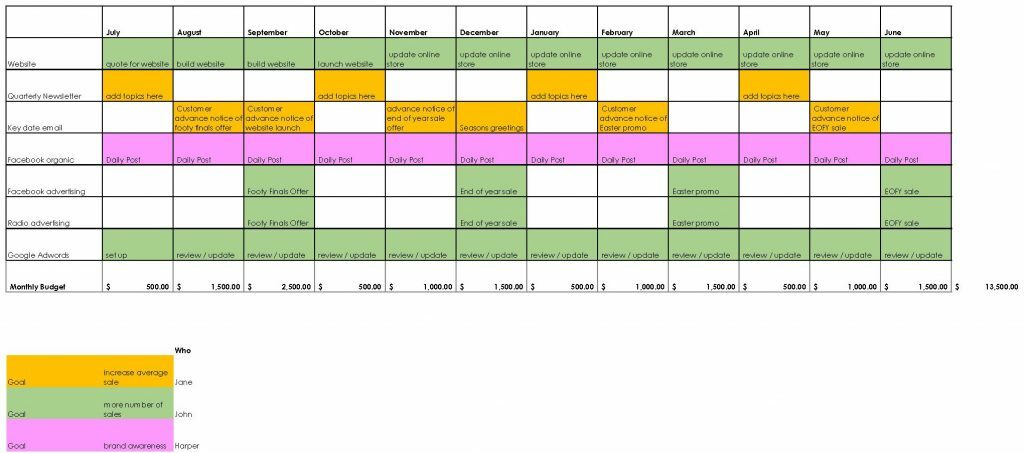4 questions to help you start your marketing
When it comes to marketing, one of the most common things we hear from small businesses is “I don’t know where to start”.
Yes, marketing can seem overwhelming, or hard, or scary. Particularly when there are sooooooo many options out there, or you are not a marketer.
And, it’s often said that taking the first step is the hardest, no matter what it is that you’re setting out to do, that first step can be hard or scary or overwhelming.
BUT – it’s also the most important step.
The thing is, if you can make that start, make that first step to starting your marketing then the rest really doesn’t seem so overwhelming.
Especially if your first step is to put together your marketing strategy.
Yep – start with strategy.
So I always say “if you don’t know where to start with your marketing start with strategy”
Even if it’s a really, really, simple strategy.
So let's take the first step.

Here are four questions to ask yourself to start building your marketing strategy:
1. Where do I want to go? Or, what do I want to achieve?
In other words, what are your goals?
Link this to your overarching business strategy. Do you want more people to:
- be aware of your business name
- know what you do or sell
- increase the amount of money they spend with you (other wise known as average $ sale or share of wallet)
- walk through your shop door or visit you online
- something else
Once you’ve identified your goals, write them down and then ask yourself:
2.Who is my ideal client?
Before planning or starting any marketing activities, you need to know who your ideal clients are. This is probably the most important thing you can do when it comes to your marketing. It's also not easy, which is why a lot of business people don't do it – however it absolutely is 100% worth the effort and you will reap the benefits.
Remember, your ideal client (aka your target market) isn't just anyone who might buy from you – and it's certainly not everyone. While it's easy to think that your product or service is for everyone, the reality is that not everyone will buy your products or choose to do business with you. Trying to appeal to everyone often means your marketing ends up resonating with no one and you are wasting your hard-earned $$$ on ineffective marketing.
Knowing who your ideal client is helps you tailor your marketing, so you’re talking directly to those people who are most likely to buy from you or choose to do business with you. It’s about understanding who they are (their demographics) and what drives their decision making (their psychographics) so your marketing dollars are spent wisely, and you get the best return on your marketing investment.
You can read more about the basics of defining your ideal client here.
3. How do I get there? Or what do I need to do to achieve those goals?
This is where you work out all the marketing options available to you that can help you achieve your goals. Essentially, it's starting to build your marketing plan.
You marketing plan can include a long list of marketing things you want to implement – just remember that you don’t have to do all of them.
Start with listing all the possibilities – call it a marketing wish list. Oh, and while you're writing your marketing activity wish list, look into how much each of the things on your list will be annually, ie the dollars $$.
For example, you could say “I need to…
- have a website ($3,000)
- connect with my database regularly, ie email marketing ($2,500)
- build a digital/social presence ($12,000)
- advertise – digital or traditional ($40,000)
- network more ($1,000)
- hold events ($6,000)
- update the signage of my store/office ($4,000)”
4. What is my budget?
Marketing should have a budget. As a business owner you should know your numbers and know what you can invest in your marketing. So it's important to set your total budget for the year. If you don't know what your marketing budget should be, look at what you can afford to invest.
How do you know what you can afford? Well, every business has different financial circumstances, so your marketing budget should reflect your circumstances, so consider talking to your bookkeeper or accountant. They’ll likely advise starting conservatively, especially if this is your first time budgeting for marketing. The goal is to avoid overspending so begin with a reasonable amount and adjust it as your marketing efforts start to pay off.
Once you've set your annual marketing budget, break it down to monthly, so you know what your marketing investment will be each month.
Then choose your preferred marketing actions from the marketing wish list you created from question 3. If you can’t fit everything you want to do in your budget, then drop it off the list for the time being (put those marketing activities into a future marketing list).
Ideally, you’re choosing the actions that should give you the best bang for buck, ie the ones that will give you the most valuable results in achieving your marketing goals.
For example, if you are wanting to increase your database, a Facebook advertising campaign with a “sign up and get something for free” call to action can be a low investment, high return option. Just make sure you target the campaign in front of people who will see value in your product/service and not unsubscribe after they get their free thing (aka your ideal clients).
Building a really really simple marketing plan
Once you’ve answered those four questions, you can build your marketing plan.
A simple way is to put all your details details into a one page spreadsheet that outlines:
- Your goals
- Your marketing activities
- Your investment in each marketing activity (your marketing budget)
Here’s an example. It doesn’t look too scary does it?

I recommend documenting your ideal clients on a separate worksheet that you can reference when creating your marketing content.
What next?
It's time to action your plan.
If you have a team, work out who will be responsible for what. And, as you can see in the plan above, you can identify when will they action your plan.
If it’s just you, then you don’t need to put that part into the plan unless you want to.
Make sure you then book time in your calendar to ACTION YOUR PLAN. In fact you may simply want to build your plan directly into your work calendar (blocking out time on appropriate days) so you don't forget when you need to do what.
It's also important to check your plan progress – at least monthly. Look at the results you are achieving compared to your original goals. Track how you're going and if you're heading towards achieving your marketing goals.
If you're not getting the results you're looking for you may need to adjust some aspects of your marketing. Check out my blog on Four Things You Can Do If Your Marketing Isn't Working.
The important thing to remember when checking your progress is that there is no magic silver bullet.
Marketing takes time.
The impact of starting your marketing will not happen overnight, but it will happen… eventually.
Be patient and allow your marketing an absolute minimum of three months, preferably six before you expect to see results.
Finally, a really good reason to start with a plan is because, according to Coschedule, you are 313% more likely to report success if your strategy is documented.
So there you go, four questions to help you start your marketing. Sally forth, take that first step to starting your marketing. And good luck.
If you're still not sure where to start, let's catch up and find out how we can work together to get your marketing happening.



